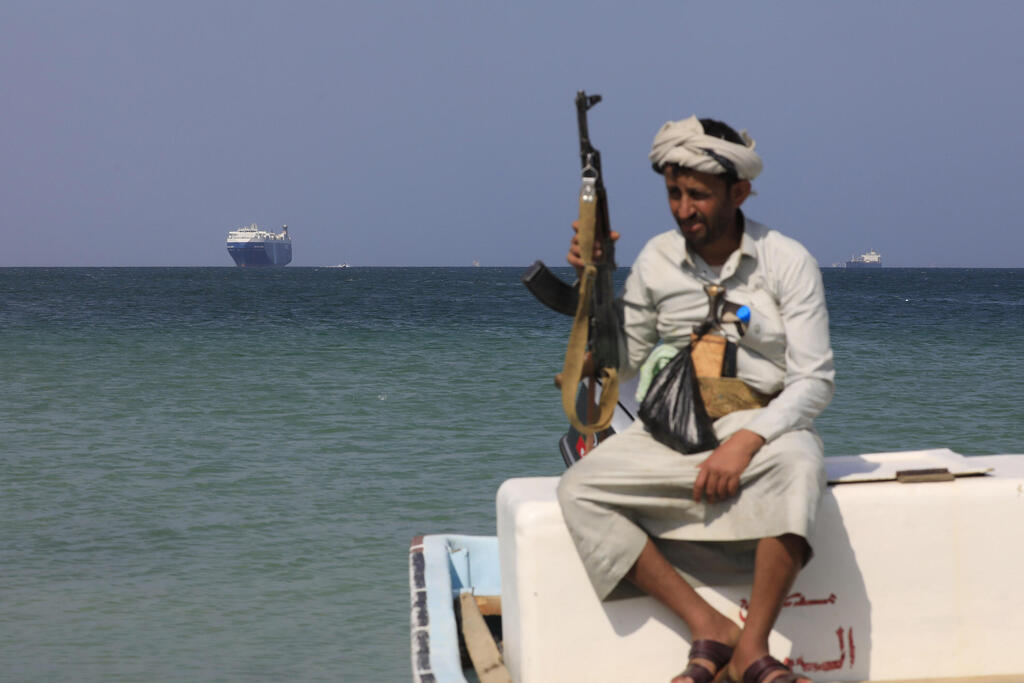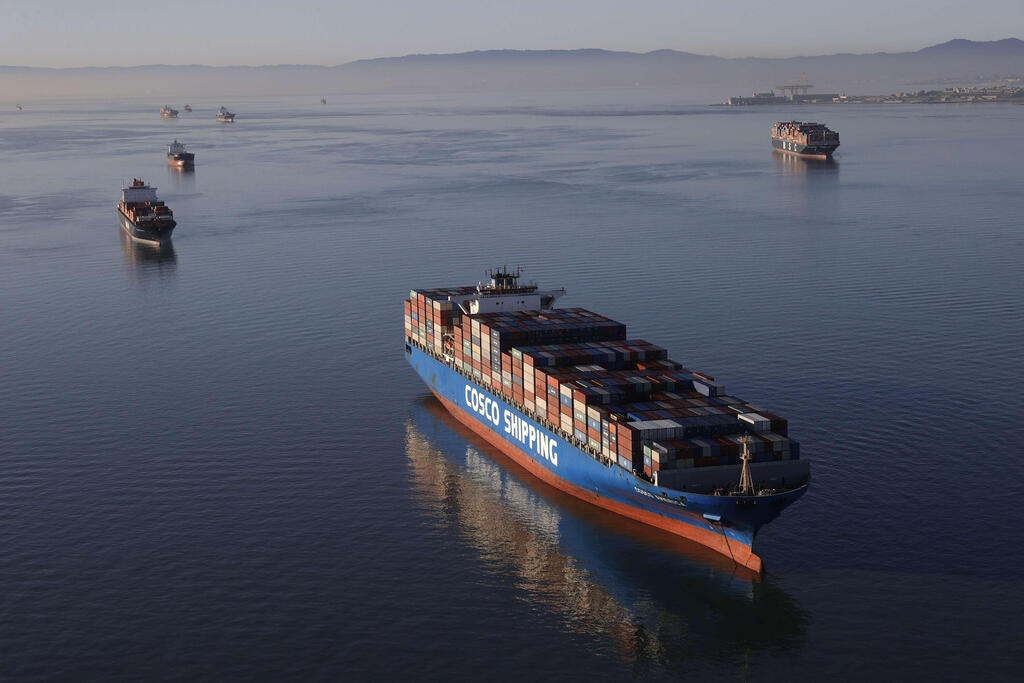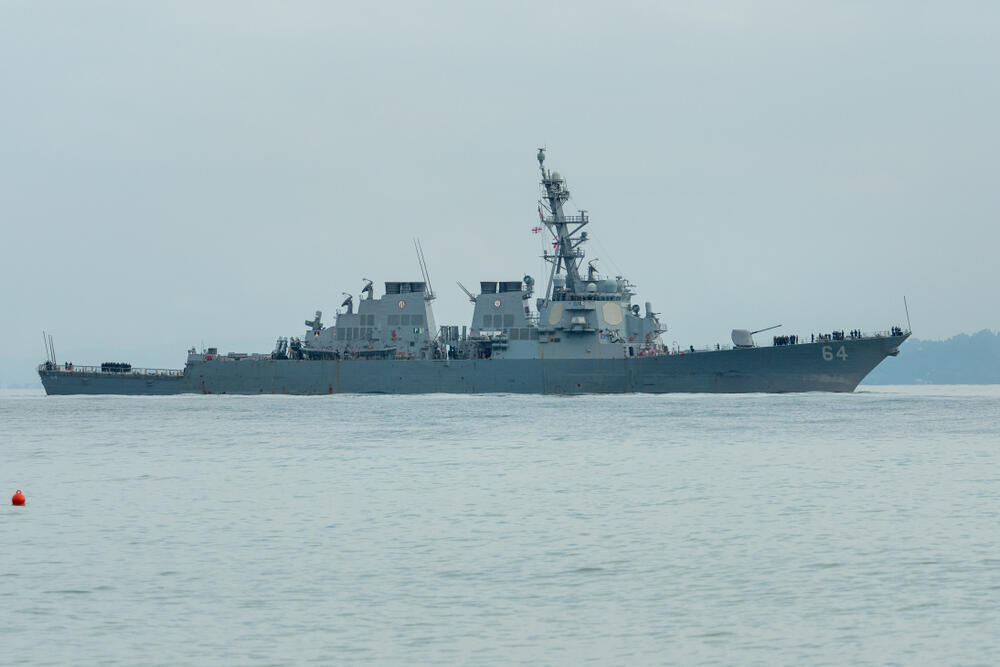After the world’s largest shipping and logistics company, Maersk announced its intention to cease all operations in the Red Sea and the strait of Bab al-Mandab, a stone's throw away from the western Yemenite coast, it would appear the Houthis have been emboldened by their success, as other shipping companies have made a similar decision.
Read more:
The Yemen-based Islamist rebel group, one tentacle in the Shiite octopus that is the Islamic Republic of Iran, confirmed on Monday their intention to attack and raid other shipping vessels brave enough to venture these perilous waters, especially those carrying cargo intended for the port of Eilat, on the Red Sea’s northern tip.
Prime Minister Netanyahu and Defense Minister Austin
(Video: Kobi Gideon, GPO)
These incessant Houthi attacks are compromising national economies in the area, and not only Israel’s. Additionally, they hinder the economies of countries who send these vessels over, with China perhaps chief among them. This resulted in the Suez Canal’s operations significantly slowing down.
During Secretary of State Blinken’s latest press conference, he was asked at what point does the United States begin taking these Houthi raids seriously and sounded rather non-committal, but National Security Advisor Jake Sullivan confirmed beforehand that Defense Secretary Austin will travel to the region to bolster international presence for a counter-Houthi effort. Monday afternoon, Secretary Austin reiterated U.S. support for Israel, but did not elaborate much on the Houthi issue.
"This is a battle against the Iranian axis, the Iranian axis of terror, which is now threatening to close the maritime strait of Bab al-Mandab,” Netanyahu said. “This threatens the freedom of navigation of the entire world. I appreciate the fact that you're taking action to open that strait. It's not only our interest, it is the interest I think of the entire civilized community.”
Austin responded by saying: “America's commitment to Israel is unwavering and no individual, group or state should test our resolve. So in the Red Sea, we're leading a multinational maritime task force to uphold the bedrock principle of freedom of navigation. Iran's support for Houthi attacks on commercial vessels must stop. Now, we'll continue to provide Israel with the equipment that you need to defend your country, Mr. Prime Minister, including critical munitions, tactical vehicles and air defense systems.”
Houthis claim they’ve attacked two ships in the Red Sea, one of which was Norwegian-owned Swan Atlantic and a freighter called MSC Clara. Yahya Saree, the Spokesperson for the Houthis, claimed these attacks were brought about by those ships’ failure to answer repeated calls. It’s worth noting The Swan Atlantic was aided by the USS Carney, an Arleigh Burke-class mission destroyer, that shot down several attack drones sent by the Iranian proxy.
This tanker is owned by Inventor Chemical Tankers, a Norwegian company that provides marine support services. The company has confirmed the attack, and said no one was killed or injured, and has equally denied any relation to Israel, and has since sailed away from the area.
Regarding the MSC Clara, Houthi motives remain elusive, despite a string of reports confirming Houthi attacks against vessels crossing the strait of Bab al-Mandab, which marks the southern edge of the Red Sea. Reports indicate the incident occurred some 28 miles from the Yemenite port city of Mukha.
Houthi escapades harm Egyptian economy
These incidents have been ramping up with some urgency ever since the Houthis fired their first missile at Israel, announcing their alleged support for Palestinians in Gaza. Initially promising to limit their attacks only to vessels bound for Israel, but have since expanded the scope of these attacks to any ship that ventures into the area, regardless of destination.
British Petroleum, infamous for its 2010 massive oil spill off the southern U.S. coast, has also announced they will not send any ships into the area. Being the 3rd largest oil and natural gas company in the world, this could have serious financial repercussions.
Evergreen and the Hong Kong-based OOCL have made a similar call, citing “operational considerations”.
Short of taking the Houthis on and eradicating their naval presence to allow reentry for so many ships, the other option is making a ridiculously long detour around Africa, a move that is sure to cause a massive price spike for countries who are supposed to receive these shipments and send them to their local retail outlets.
The strait of Bab al-Mandab has immense strategic importance, and surrendering control to the Houthis will have far-reaching implications on economies worldwide, with cargo estimated at over a trillion dollars annually going through.
This could have a severe impact on the Egyptian economy, since every ship bound for the Suez Canal has to go through the strait, and taxes levied by the Egyptian government for passage is a substantial moneymaker for their local economy.
While Israel has shown reticence for direct engagement with the Houthis despite repeated missile and drone launches toward Eilat, it has equally signaled that should no outside intervention manifest, it will take it upon itself to change a rather problematic status quo.
With this warning in mind, the U.S. has announced its intention to form a broad Red Sea Maritime coalition to neutralize Houthi influence, with countries such as Italy signaling their willingness to join such a globe-spanning effort.
In effect, this will be an expansion of the 39-nation-strong "Task Force 153", which up until now has combated the problem of Somali piracy in the region.
Lending added credence to their announcement, the United States has already brought the USS Eisenhower and its accompanying fleet of warships closer to the Arabian Sea.
How international will this coalition be?
France and the UK have already bolstered their naval presence in the area, with some downed Houthi drones and missiles already marked in their win column. As mentioned, Italy is strongly considering the idea, and should announce its final decision by week’s end.
The British Guardian newspaper has reported a U.S. announcement on the formation of such a coalition is imminent, and that such a coalition will likely include some Sunni nations, such as Jordan, UAE, Saudi Arabia, Qatar, Oman, Egypt and Bahrain, that are worried about Iran’s potential regional dominance.
This announcement, according to the Guardian, could occur while Secretary Austin is still in the region, since his Israeli visit is to be followed by touching down in both Qatar and Bahrain. The name for said coalition, at least temporarily, is Operation Prosperity Guardian.
Not content with Arab and European inclusion, reports indicate the U.S. has even approached China with a request to join, though no further reports on China’s response have thus far surfaced.
When it comes to the issue of how necessary it is to build such a wide coalition to begin with, expert opinions vary. While some believe the current roster of Task Force 153 is more than sufficient, others say the more the merrier, and will facilitate a smooth transition toward an attack on Houthi targets.
A military researcher named Mohammed Mansour believes the existing task force has all the necessary capabilities to launch an attack that could set the Houthis back quite a bit, but the cost would be increased Houthi aggression, which could necessitate attacks on Yemeni soil.
It is widely believed that the U.S.'s eagerness to build this coalition stems from the desire to prevent a direct Israel-Yemen conflict and to avoid a situation where it seems the U.S. is antagonizing Iran. Since the coalition will be multinational, a claim like that would not have much authority.
On their end, the Houthis have said that while their position will remain unchanged until Israel ceases all aggression in Gaza, they are open to toning down their hostile actions should humanitarian aid be allowed inside the enclave.







